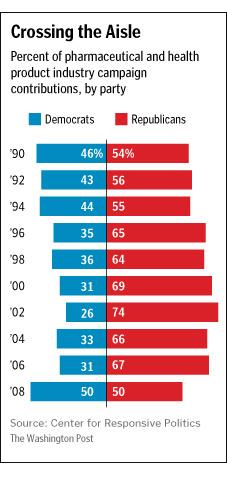|
Pharma Lobby and Democrats
|
||
|
Fierce Pharma
and also the Teddy Roosevelt's advice that, "We must drive the special interests out of politics. The citizens of the
Drug Firms Woo Democrats, Helping Defeat Their Bills
|
||
|
The pharmaceutical industry, long an ally of Republicans, has increasingly worked
itself into the good graces of the Democratic Party and by doing so has helped block the Democrats' top prescription-drug
initiatives. In the year since they took over on Capital Hill, Democratic leaders have been
unable to pass either a bill allowing reimportation of drugs from Drug companies have gone on a hiring binge, retaining Democratic lobbyists
in dozens of major firms. This strategy, which K Streeters call "clogging the system," prevents adversaries from hiring anyone
from those consultancies. The drug lobby has also wooed congressional Democrats by plowing millions of dollars into helping
with another Democratic goal: expansion of the children's health program. In a detente with its traditional foes, the drug
industry joined a group that included AARP and Families USA to buy about $7 million in ads backing the expansion of the program,
under which states receive federal money to provide health insurance to families with children. The industry's main lobby, the Pharmaceutical Research and Manufacturers of
America, known as PhRMA, paid for most of the group's budget. "They have all the money," explained John Rother, policy director
of AARP, which is no slouch when it comes to spending money on lobbying. "They're the ones who can write the big checks."
In years past, when pharmaceuticals leaned heavily Republican, Democrats
did not have much reason to cut them a break or side with them on policy. Democrats won control of Congress in 2006 in part
by accusing Republicans of being too close to drug companies and other "special interests." But now that pharmaceutical money
is available to both parties, the drug companies have reason to hope for better treatment. The Democratic takeover of Congress means "we just have more friends than we used
to have," said PhRMA President W.J. "Billy" Tauzin, a former Republican congressman from The industry worked closely with the previous Republican-controlled Congress to
shape a Medicare prescription-drug program that included a provision barring the government from negotiating with drug companies
for lower prices. Democratic leaders have wanted to require such negotiation but were stopped initially by GOP resistance
and an analysis by federal auditors that found that the impact of negotiation on prices would be small. {Then why is it so large—as much as 300% in Democrats had similar reservations about a bill that would legalize reimportation
of lower-cost prescription drugs from Most Democratic leaders are still eager to push this legislation, which the Still, representatives of both the political left and right said the drug lobby's
influence will make that hard. "They are an extremely powerful, effective lobby," said Sen. David Vitter of PhRMA boosted its spending on lobbying last year by 25 percent, to more than
$22 million. The increase made the group the second-largest purchaser of lobbying services -- which includes both lobbyists
and issue advertising -- after only the capital's perennial top spender, the U.S. Chamber of Commerce, according to CQ MoneyLine,
which tracks money in politics. |
|
 |
||
|
Patterns speak louder than words. One
pattern is the let’s legislate
a fix. Bills are proposed all too often for reasons other than fixing a problem. Among
them are 1) squeeze an industry for more contributions, 2) make the other party look worse, 3) to get television time. The fix will end up 1) modified on page 109 so that it won’t fix the problem,
2) voted down, 3) vetoed, 4) never come up for a vote, 5) be bounced back and forth between the House and Senate until the
session of Congress expires. As
P.J. O’Rouke said, the one thing that politicians stand for is getting elected.
|
|
